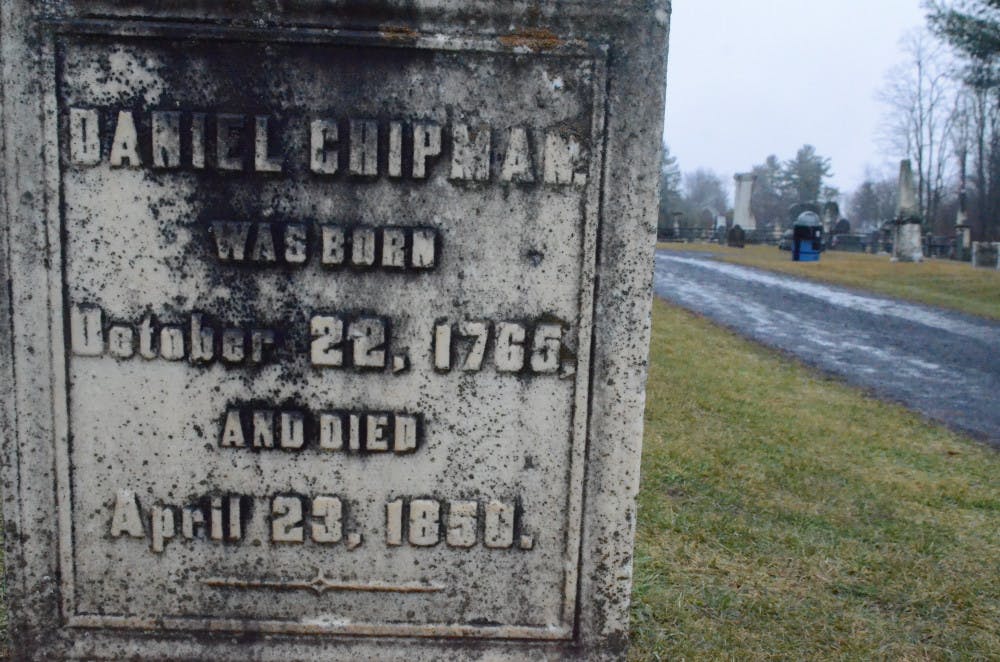Cemeteries rarely make the pages of a newspaper. Graveyards tend not to interfere in the affairs of living individuals, confining the dead beneath endless rows of slate tombs, engraved with reticent epitaphs, and haunted by silence. Though people have performed burial rituals since before they were really human (excavations have revealed Neanderthal burial customs), few cultures hide death so thoroughly. As a professor and director of graduate studies of American art and architecture at Stanford University Keith Eggener explains, graveyards are “seen as an American phenomenon. We send our old people off to homes and hospitals to die; we only go to the cemetery for funerals and then avoid them.”
This defining impulse, to cloak life’s most troubling experience (its end) in dry ceremonial form, tantalizes a reporters imagination, provoking the infinite mystery of uncovering the memories symbolized by these architecturally modest slabs of rock.
West Cemetery, an expanse of land framed by South Main Street and Hepburn Road, is the eternal home to some of Middlebury’s earliest pioneers. This series profiles the daring individuals who settled Vermont’s thick pine forests, battling the famines, violence and blizzards that plagued frontier life in America’s infancy. Like all graveyards, West Cemetery elicits frustratingly little information about its residents, evoking an eerie sense of secrecy.
On Daniel Chipman’s (Oct. 22, 1765 to April 23, 1850) tombstone, the Chipman Family coat of arms is engraved — a white escutcheon dotted with six stars, crossed by a red shoulder belt, exhibits an intriguing detail. A white leopard rests on top the shield in a stance of ferocious anticipation, wearing a crown, which, according to one Chipman family genealogy, was bestowed to a soldier who first attacked the walls of a besieged city, a tradition harking back to the families origins in Bristol, England. Future generations of Chipmans would continue to embrace this intrepid spirit.
John Chipman, who left Barnstable, England for Boston, Mass. in 1631, a fatherless pauper, quickly rose to prominence in America’s early Plymouth colony as a churchly patriarch and Deputy to Court. In 1775, his grandchild, Samuel Chipman relocated from Salisbury, Conn. to Vermont’s rugged western frontier in Tinmouth, Rutland County to work as a blacksmith and farmer with his wife Hannah and six sons, one of whom was, Daniel Chipman.
Daniel toiled on his family’s farm throughout his youth. His brother, Nathaniel, tutored him in law. In 1784, Daniel entered Dartmouth, and his “confirmed habits of industry” propelled him to the top of his class. Soon, every courtroom in Addison County and several bordering ones, witnessed Daniels impassioned arguments, earning him the reputation as one of the regions most capable lawyers, along with Vermont legend Samuel Miller. According to Smith’s History of Addison County, published in 1886, his persuasive talents emanated, “from the power of his argument and the weight of his opinions, rather than from any polished oratory.”
In 1794, the year Daniel moved to Middlebury, the town contained only 62 buildings. The villagers constructed a courthouse to host Vermont’s itinerant state legislature in 1800 and 1806, which served as the community’s sole meeting space until the erection of a church in 1809. The yeomanry of this agricultural village, like most rural America, was largely Republicans, and thus favored a decentralized preindustrial nation. Daniel, however, ascended local politics as a proponent of the Federalist Party. An article titled “Early Congress Man” from Green Mountain Heritage, a regional periodical, explains he attended five different constitutional conventions.
He shocked the House of Representatives, serving as its Speaker, when he refused to resign his chair to the governor, as social custom dictated, hushing scores of legislators who insisted on addressing the governor as chairman. The governor, feeling uncomfortable in his new undignified seat to the right of Daniel, turned to the Speaker and said, “there seems to be great confusion.” To which Daniel responded “there is indeed, but your excellency may rest assured that the most perfect order will be preserved in the House, over which I have the honor to preside.” An 1836 speech he gave in Montpelier insists that respecting divisions of power is essential to check the dangerous tide of un-tempered ambition, and that habit stunts individuals ability complete the delicate task of harmonizing various areas of power.
At the 1850 Vermont Constitutional Convention, illness forced him to retire. He died shortly after his return, in his Ripton Mansion.
Despite embracing the distinct self-sufficient character of Vermont’s frontier, Daniel held firm to the conviction that individuals needed to respect a broader set of shared laws and institutions, expressly faithful that the United States Constitution could check the type of raw aggression he witnessed in the American Revolution and War of 1812. He was fortunate to die in 1850 and not 10 years later, when the Civil War started.
A Walk Through West Cemetary: Chipman Family

Comments


